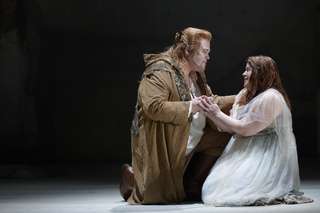|
Back
A thorough success Toronto
The Four Seasons Centre for the Performing Arts
04/30/2011 - and May 3, 12, 15, 18, 21, 27, 29, 2011
Richard Strauss: Ariadne auf Naxos
Adrianne Pieczonka/Amber Wagner* (Prima Donna/Ariadne), Richard Margison (Tenor/Bacchus), Jane Archibald (Zerbinetta), Alice Coote (The Composer), Richard Stilwell (The Music Master), Wayne Easterlin (The Dancing Master/Brighella), Pater Barrett (Harlequin), Thomas Hauff (The Major-Domo), Doug MacNaughton (A Lackey), Roger Honeywell (An Officer), Adrian Kramer (The Wig-Maker), Simone Osborne (Naiad), Lauren Segal (Dryad), Teiya Kasahara (Echo), Michael Uloth (Truffaldino), Christopher Enns (Scaramuccio)
The Canadian Opera Company Orchestra, Sir Andrew Davis (Conductor)
Neil Armfield (Director), Dale Ferguson (Set and Costume Designer), Denni Sayers (Choreographer), Tim Mitchel (Original Lighting Designer), Paul Woodfield (Lighting Design Re-creator)

R. Margison, A. Wagner(© Michael Cooper)
The drama quotient of the COC’s production of Ariadne auf Naxos was heightened at the opening performance with the replacement of the indisposed Adrianne Pieczonka by her cover, Amber Wagner. As it turned out, Miss Wagner triumphed. Her voice is truly dramatic, with both amplitude and nuance. Readers might know her from the 2009 film The Audition in which she is one of the winners of the 2007 Metropolitan Opera auditions. She hasn’t had many high-profile chances to perform yet. I was lucky enough this March to see her perform Elsa in Lohengrin in Chicago (also conducted by Andrew Davis), a role she will be repeating this summer in Savonlinna. We look forward to hearing her here again.
The production is from the Welsh National Opera and is directed by Neil Armfield who gave us a wonderful Midsummer Night’s Dream a couple of seasons ago. The first act (actually the prologue to the opera proper) is set in the workaday backstage area of what we are told is the private theatre of the richest man in Vienna, where the bustle and cross-currents created by the opera’s 16 characters are deftly set out. It’s great to see veteran singer Richard Stilwell as a wise Music Master. John Easterlin is an in-your-face Dancing Master (and later is effective as a Buster Keaton-esque Brighella). The singer who dominates the first act is The Composer; Alice Coote has the role down to perfection both vocally and dramatically.
In Act I the rich man’s major-domo tells the assembled players that his boss is displeased that the opera he has commissioned is set on a desert island. When the curtain rises on Act II (the opera proper) we see that not only is it a desert island, but the shabbiest part of one. The tattered set has one benefit in that it provides plenty of peepholes for the comedians to observe and comment upon the noble Ariadne and her tragic plight. Later, as the work moves into its transcendent finale, we get at least a glimpse of a starry empyrean and an indication of the concluding fireworks.
Ariadne has a rival as the central figure of the opera - Zerbinetta - in this case Jane Archibald. It was announced that she had a chest infection but this did not seem to affect her performance. While she performs her dazzling big scene there is a lot of byplay with her troupe of four comedians. Denni Sayers’ choreography blends so well with stage movement that it doesn’t call attention to itself, and the end result is very effective. Peter Barrett as Harlequin - he seems to be Zerbinetta’s favoured man for the moment at least - has the biggest role of the four and does well with it.
There were moments when one might want more vocal oomph from Ariadne’s three ladies (Naiad, Dryad and Echo), but they certainly sound fine (just a little recessed). Here again stage movement, some of it very subtle, adds an element of enchantment.
Bacchus finally makes his appearance, in this production descending from the fly tower. The role makes no room for a few warm-up lines for the tenor and this doesn’t seem to faze Richard Margison. The unyielding tessitura of the vocal line is cited as proof that Strauss hated tenors. His tone might falter at a few points but the voice is absolutely right for the role.
Sir Andre Davis was Music Director of the Toronto Symphony Orchestra from 1975 to 1988 (and maintains his TSO link today as Conductor Laureate), and is finally making his COC debut with this production. If he isn’t listed among the distinguished Straussians of the day, this performance gives evidence as to why he ought to be. The wonderful acoustics of the Four Seasons Centre obviously help a lot - the smallish orchestra (40 members as specified by the composer) swells up to a big rich sound when required. I can’t help but recall the last time the COC produced the work (in 1995 in the Bad Other Place) the orchestra sounded like an accordion accompanying a couple of kazoos. (And it wasn’t the orchestra’s fault.)
In short, this opera’s intersecting trajectories of grandeur and farce are exceedingly well presented.
Michael Johnson
|